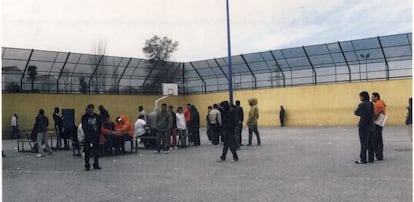Like a jail, only a lot worse
The Aluche immigrant detention center in Madrid is a regulatory no-man's land


The holding cells visible behind the bars hold eight bunk beds, a sink and some shelves; there are no toilets and no lockers inside them. The so-called recreation rooms have precious little recreation going on inside: both rooms - one for men, one for women - are dark, dirty, littered with paper and wrappers, and furnished with nothing more than a few steel tables and chairs, a television set with no remote control, and vending machines selling snacks and drinks.
There are people sitting on the floor on blankets and sleeping bags. The January cold is keeping everyone indoors. The medical service is working full-time, but there is no nurse's room to isolate a patient if necessary, if the illness does not require actual hospitalization. The only cell with a toilet in it is the isolation unit - a tiny, desolate space with tiled walls and a cement bench that doubles as a bed once a mattress is thrown on top.
Welcome to the Aluche Alien Internment Center (CIE). It works a lot like a prison, except the conditions are worse than in most modern Spanish penitentiaries. Its interns are not prisoners. They are here mostly because they entered the country without legal papers.
On a recent visit, there were around 30 women at the center, and they spent most of the day inside the recreation room, where they were served breakfast, lunch and dinner. The men, around 200 of them, had to take turns since they could not fit into their own recreation room all at once. The first shift spent the morning in the common room and went up to the cell area in the afternoon, when the second shift came down. (The cells are not kept locked during the day so the immigrants are free to move around, except that there is nothing to do.)
The women were calmer, and whiled away the time sitting in little groups or sleeping on the floor. But the complaints were flying in the men's room. "I'm number 3,399. Please, I want to be deported back to my country right now," said one migrant. "This place is unbearable, it's dirty and horrible. There is nothing to do in all the hours that we spend here. They mix up criminals with people without documents who've never done anything bad. There are madmen who, until they are identified and isolated, could do anything to the rest of us. They won't let us keep our cellphones, or our suitcases with our things. We can't even have a bed sheet to block out the light in our cells."
The speaker is an Argentinean who is desperate to go home. Many others write or shout out their ID numbers while listing their complaints about the center.
Detainee protests like these - here and at other holding facilities across the country - have been the norm for years. There are currently around 750 migrants being held at nine centers; Algeciras, Barcelona, Málaga, Murcia, Fuerteventura, Las Palmas, Tenerife, Valencia and Madrid, according to police sources. The system is at 65 percent capacity, although some facilities are full while others are nearly empty, most notably the three centers in the Canary Islands.
Undocumented foreigners can be detained for a maximum of 60 days before deportation or removal. Although they are not prisoners, they are deprived of their freedom, and the only people on hand to keep things in order are police officers who are forced to act as prison wardens. The Ombudswoman has requested that the police be assigned to external surveillance duties only, and that social workers be brought inside.
An architectural problem - or in other words, a budget problem - puts criminals in the same space as people with no police record. Immigrants basically land in one of these centers because they lack residency papers, because of a public order crime or because a conviction has been replaced with a deportation order. In a penitentiary, preventive prisoners are not kept in the same area as convicts, and even these are separated according to how dangerous they are considered. At the migrant detention centers, however, everyone shares cells and a single common room.
A judge who oversees the Aluche center, Ramiro García de Dios of Madrid Courthouse No. 6, recently issued a writ deploring the conditions of the migrants being held there. While it is true that they do not spend as much time in there as inmates spend in prison, it is still up to 60 days spent in filthy, overcrowded, poorly lit rooms and living under limited rights that are not specifically encoded anywhere. Only a brief mention in the Alien Law and a ministerial order from 1999 set out any kind of rules on how these centers should be run.
The Aluche detention center has been in the eye of the storm ever since a Congolese woman died there in mid-December. The cause of death has not yet been established, but it is a known fact that she requested medical assistance up to 10 times before being taken to hospital. Soon after that, in early January, a 21-year-old from Guinea died at the Barcelona facilities, after which the Ombudsman's office paid a visit that unveiled many shortcomings in the center's health assistance services and urged the Interior Ministry to act.
The Ombudsman, several judges, bar associations and non-profit groups all agree that there is an urgent need for some sort of regulation establishing the exact conditions that these holding facilities must meet, how interns must be treated and all other related issues that are now being addressed any way each center sees fit: some have toilets in the shared cells, others do not; some have round-the-clock medical assistance, others not; some have complaints forms at the detainees' disposal, others do not; some may read a list of their rights in their own languages, others cannot.
In the case of the Aluche center, since December 2009 three different judges of different ideologies have worked together to improve living conditions by issuing orders regarding the deficiencies that were found there. In a way, seeing the lack of existing legislation, they have slowly improved the conditions themselves.
For one thing, they demanded round-the-clock medical assistance; they also requested that police officers wear clear identification, that managers install mailboxes for complaint forms that any detainee can address to the local judge, that nobody be kept in the isolation cell for more than a day, that non-government organizations be allowed to visit the center, that visiting hours be extended, that enough toiletries be handed out for adequate personal hygiene, that detainees be given a medical report when they are seen by the doctor, and that they be allowed to report any aggression to the courts. These same magistrates also attempted to improve food safety by ordering that everything served at the center be in perfect conditions and the trays kept clean.
Yet these demands have often clashed with arguments about center safety. That is the reason why managers say detainees are not allowed to use their cellphones or keep their personal effects in their own cells, nor have lockers of their own. And then there is the problem of money. Since January 2010, the center has been unsuccessfully requesting that toilets be installed in all the cells. This project finally seems to be underway, after numerous complaints lodged by people who said that the common toilet area was locked at night and that they were being forced to relieve themselves inside bags. In November, the three judges issued a joint order that the shared toilet area must be opened no more than three minutes after someone rings the bell.
So far, nobody has managed to ensure that moisturizing cream be made available for the detainees; the sub-Saharan migrants complain that this climate wreaks havoc on their skin.
"The main problem is the very concept of the detention centers in the law," says the acting Ombudswoman, María Luisa Cava de Llano. "First, the penitentiary paradigm is established, but then we say that a different loss of liberty prevails, without regulating its conditions and limits. There is a legal obligation and a real need for specific regulation."
Tu suscripción se está usando en otro dispositivo
¿Quieres añadir otro usuario a tu suscripción?
Si continúas leyendo en este dispositivo, no se podrá leer en el otro.
FlechaTu suscripción se está usando en otro dispositivo y solo puedes acceder a EL PAÍS desde un dispositivo a la vez.
Si quieres compartir tu cuenta, cambia tu suscripción a la modalidad Premium, así podrás añadir otro usuario. Cada uno accederá con su propia cuenta de email, lo que os permitirá personalizar vuestra experiencia en EL PAÍS.
¿Tienes una suscripción de empresa? Accede aquí para contratar más cuentas.
En el caso de no saber quién está usando tu cuenta, te recomendamos cambiar tu contraseña aquí.
Si decides continuar compartiendo tu cuenta, este mensaje se mostrará en tu dispositivo y en el de la otra persona que está usando tu cuenta de forma indefinida, afectando a tu experiencia de lectura. Puedes consultar aquí los términos y condiciones de la suscripción digital.








































